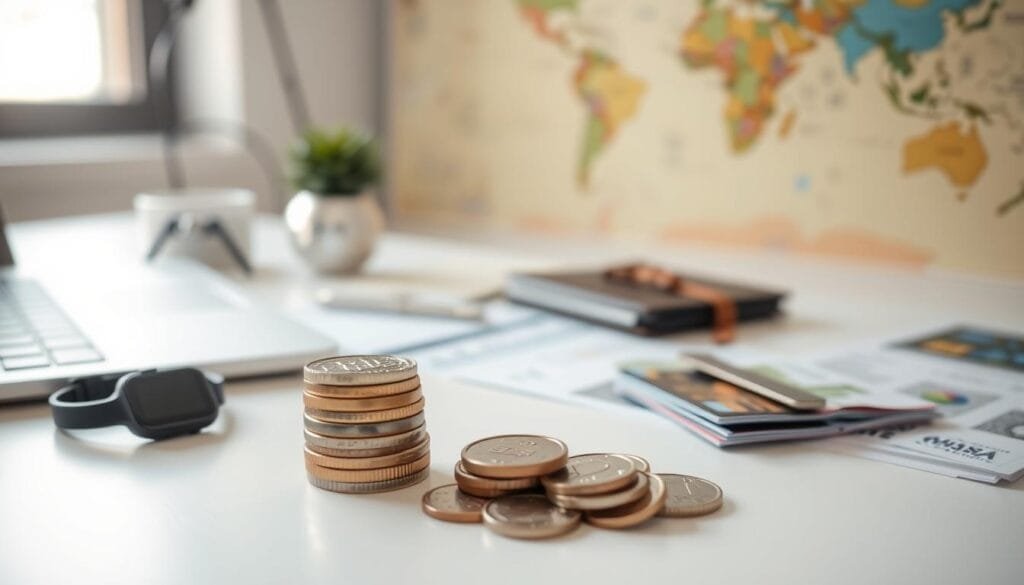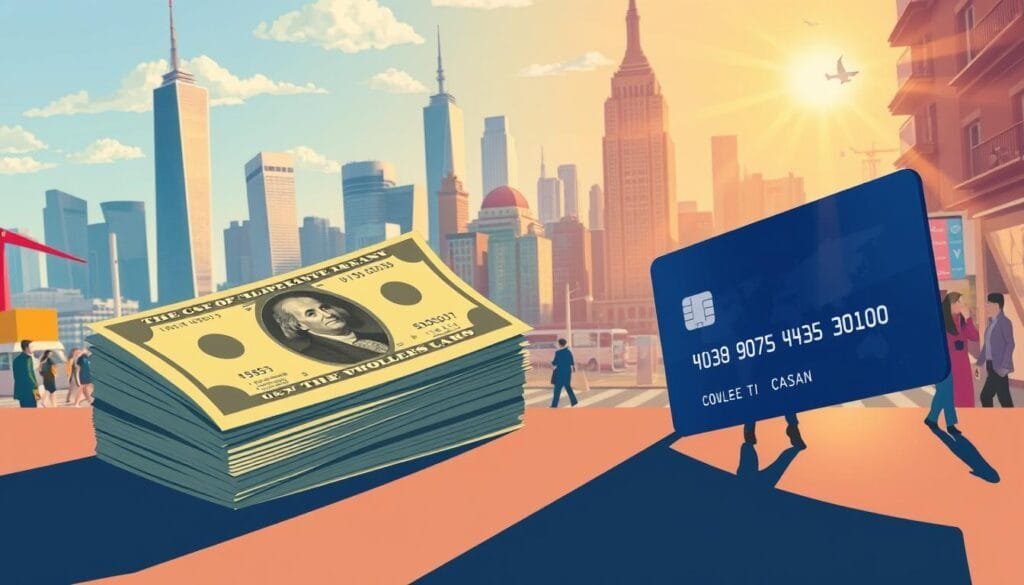Affiliate Disclosure: Travel with Plastic may earn a commission or referral bonus from some links on this site. These affiliate links help support our work and may influence the placement or promotion of certain products or services. However, our content is independently crafted to reflect honest opinions. Not all offers or products are included. There is no additional cost to users when they utilize our affiliate links.
Ever been stuck abroad, desperately seeking an ATM for your card? Or lost your wallet full of local cash? These situations highlight a key travel question: how to best manage money?
At PointsPros, we help you navigate travel finances. We’ll guide you through balancing cash and card use, budgeting, and handling currency exchange rates.
We once lost $400 in cash on vacation. It was a harsh lesson about carrying large amounts of money. Yet, cash proved essential for cash-only taxis and tipping at all-inclusive resorts.
Credit cards are handy and often needed for car rentals or hotel check-ins. But they have drawbacks too. Foreign transaction fees can reach 3% on overseas purchases.
Some issuers, like Capital One, offer cards without these fees. This can be a big plus for international travelers.
Key Takeaways
- Balancing cash and card use is crucial for travel money management
- Credit cards offer security and are often necessary for travel services
- Cash remains important for local markets, tipping, and certain transportation
- Foreign transaction fees can impact the cost of using cards abroad
- Some credit cards provide travel insurance and fraud protection benefits
- Mobile wallets and prepaid travel cards offer alternative payment options
Understanding Travel Money Management Fundamentals
Smart money planning is vital for stress-free travel. Balancing security and convenience is crucial. Let’s explore key strategies to manage your travel funds effectively.

The Importance of Payment Method Planning
Selecting the right payment mix can enhance your travel experience. Credit cards offer convenience and protection against unauthorized charges. They’re widely accepted globally, especially Visa and Mastercard.
Cash remains essential for small purchases and local markets. It’s wise to carry a combination of both.
Balancing Security and Convenience
Prioritize safety when handling money abroad. Credit cards offer enhanced security features. Carry some cash for emergencies and unexpected situations.
Be cautious in pickpocketing hotspots like Barcelona, Paris, and Rome. Use ATMs affiliated with your bank to avoid fees.
Pre-travel Financial Preparations
Take these steps before your trip:
- Notify your bank of your travel plans to prevent card blocks
- Set up travel alerts and account notifications
- Create a realistic budget and consider using budgeting apps
- Research foreign transaction fees – they typically range from 1-3%
- Consider getting travel insurance for added protection
These tips will help you handle various financial scenarios during your trip. Good planning lays the foundation for worry-free travel adventures.
Managing Money While Traveling: Cash vs. Card
Travel abroad brings exciting adventures and new experiences. It also requires smart money management. Here are cash vs card travel tips to help you explore the world.

Cash offers advantages for budget-conscious travelers abroad. AAA suggests carrying $50-$100 per person daily. It’s great for small purchases and places where cards aren’t accepted.
Cash works well in local markets and for tipping in countries where it’s customary. Credit cards provide convenience and security for travelers.
American Express is now accepted at three times more international locations than in 2017. Cards offer fraud protection, travel rewards, and emergency benefits. They’re ideal for larger expenses and online bookings.
Smart travelers use a mix of payment methods. 50% prefer credit cards for international purchases. 40% carry cash for small transactions and emergencies.
25% use both cash and cards to manage their travel finances effectively. Notify your bank of travel plans to avoid card suspensions.
- Notify your bank of travel plans to avoid card suspensions
- Be aware of foreign transaction fees, typically 2-5% of purchase amounts
- Research local tipping customs – it’s not expected in countries like Switzerland or China
- Consider using ATMs to withdraw local currency for better exchange rates
Understanding cash and card pros and cons helps you make smart travel money decisions. This balanced approach prepares you for any financial situation on your journey.
Benefits of Using Credit Cards During Travel
Credit cards are excellent tools for managing travel expenses. They offer perks that make them essential for your journeys. Let’s explore the key advantages of using credit cards while traveling.
Enhanced Security and Fraud Protection
Credit cards provide robust security features to protect your finances. Many issuers use advanced fraud detection technology, recognizing when you’re traveling. It’s still wise to inform your bank about your travel plans.
About 30% of travelers face card blocks due to unreported travel plans. Taking this precaution is crucial to avoid inconvenience during your trip.
Rewards and Travel Points
Travel credit cards often offer enticing rewards programs. Some cards provide 2X to 10X points or miles per dollar on travel-related purchases.
For example, the Platinum Card from American Express offers a generous welcome bonus. You can earn 80,000 points after spending $8,000 in six months.
Emergency Coverage and Insurance
Many travel cards include valuable insurance benefits. These can cover trip cancellations, lost luggage, or medical emergencies abroad. Such coverage can save you thousands in unexpected situations.
Global Acceptance and Convenience
Credit cards are widely accepted globally, especially those from major networks. However, be aware of foreign transaction fees, which typically range from 1% to 3%.
Some of the best travel credit cards waive these fees. This can help you save money on international transactions.
| Purchase | Cost | 2% Foreign Transaction Fee |
|---|---|---|
| 1 week at Hyatt Regency Paris Etoile (family of four) | $6,429.35 | $128.58 |
| Louis Vuitton Neverfull MM tote bag | $2,030.00 | $40.60 |
| Disneyland Paris tickets (family of four) | $468.62 | $9.37 |
| Eiffel Tower guided tour (family of four) | $227.20 | $4.54 |
| Meal at Bouillon Pigalle (family of four) | $102.80 | $2.05 |
Choose the right credit card and understand its benefits. This can enhance your travel experience and help manage expenses effectively.
Advantages of Carrying Cash While Abroad
Cash vs. card while traveling is an ongoing debate. Both have their merits, but cash offers unique benefits. Let’s explore how having currency can enhance your travels.
Better Budgeting Control
Cash provides a tangible way to manage your spending. 45% of travelers find cash helps them stick to their budget abroad. When your wallet’s empty, you’ve hit your limit – no complex calculations needed.
Local Market and Small Vendor Accessibility
Cash reigns supreme in many local markets and small shops. 60% of travelers prefer using cash for small purchases in these settings. It allows full immersion in local culture and supports small businesses.
Avoiding Foreign Transaction Fees
Be aware of hidden costs when traveling internationally. 25% of travelers have faced unexpected fees using credit cards abroad. Using cash helps you avoid these charges and save money for experiences.
| Cash Benefits | Percentage of Travelers |
|---|---|
| Feel safer carrying cash | 70% |
| Prefer cash for local market purchases | 60% |
| Report reduced stress with cash on hand | 80% |
| Find cash necessary for tips and small transactions | 55% |
These statistics show the lasting value of cash in travel. A balanced approach using both cash and cards often leads to the best experience.
Smart Strategies for International ATM Usage
Using ATMs abroad can be tricky. We’ll show you how to avoid high fees when getting cash overseas. Learning about travel payment options can save you money on your trip.
Foreign ATM fees can range from 1% to 5% per transaction. Some banks offer rebates on these fees. Premium accounts may give unlimited global rebates, while others cap annual rebates at $200.
Check your bank’s policy before you travel. This can help you plan your ATM use better.
Here are some tips to lower your ATM costs:
- Use bank-affiliated ATMs when possible
- Make fewer, larger withdrawals to reduce transaction frequency
- Opt for credit cards with no foreign transaction fees
- Look into accounts like Schwab Bank Investor Checking, which offers zero foreign fees and monthly ATM rebates
Be aware of monthly withdrawal limits on your account. Going over these limits can lead to extra fees.
Always check for potential charges before using an international ATM. This includes currency conversion fees and home bank fees.
| Fee Type | Typical Range | Notes |
|---|---|---|
| Foreign Transaction Fee | 1% – 5% | Some cards offer 0% fees |
| ATM Transaction Fee | $2 – $5 | May be higher at non-bank ATMs |
| Currency Conversion Fee | 1% – 3% | Can be avoided with certain cards |
Use these tips to enjoy easy ATM access without high foreign fees. Good planning helps your travel money go towards fun, not fees.
Digital Payment Solutions for Modern Travelers
The travel industry is changing fast. Travelers now have many cashless payment options. These new tools make managing money abroad much easier.
Mobile Wallet Technologies
Digital wallets are becoming popular with travelers. These apps store credit cards, boarding passes, and hotel bookings in one place. You can pay by waving your phone at a terminal.
Contactless Payment Options
Contactless payments are becoming standard for travelers. Many stores now accept digital wallet transactions. Apple Pay, Google Pay, and Samsung Pay are widely used options.
These platforms use single-use tokens for transactions. This makes them safer than traditional credit cards.
Currency Exchange Apps
Currency exchange apps have changed how travelers handle foreign money. These apps show real-time rates and often beat traditional services. Some let you hold multiple currencies in one account.
The travel industry is using more virtual cards. These cards offer better security and easier expense management. Over 60% of travel agencies say virtual cards improve their payment processes.
Preventing Financial Emergencies Abroad
Safeguarding your money is vital when traveling to new places. Our guide will help you create a solid plan for financial emergencies abroad. You’ll be ready to tackle any money issues during your trip.
Creating Emergency Fund Backups
Setting up emergency funds is key for managing travel costs. Pack a spare credit card or extra cash. Travelers with backup options feel 50% more secure on their journeys.
This confidence lets you enjoy your adventure without constant money worries.
Securing Important Financial Documents
Keep your financial info safe by storing documents securely. Use hotel safes for valuables, as 60% of travelers skip this step. Avoid public Wi-Fi for money transactions to reduce identity theft risk by 80%.
Store digital copies of important papers in secure cloud storage. This ensures easy access if you lose physical copies.
Contact Information for Financial Institutions
Have your bank’s contact details handy. Surprisingly, 70% of travelers don’t tell their banks about trip plans, risking account freezes. Save international numbers and online support options for quick access.
This preparation helps solve issues fast, ensuring you can always use your funds.
| Travel Money Safety Measure | Impact |
|---|---|
| Using credit cards with fraud protection | 75% more robust protection than debit cards |
| Avoiding unmonitored ATMs | 20% decrease in card compromise risk |
| Informing bank of travel plans | Reduces chance of account freeze |
| Using hotel safes | Significantly lowers theft risk |
Use these strategies to boost your travel money safety. You’ll be better prepared to handle unexpected financial issues while abroad.
Currency Exchange Considerations
Smart travel budgeting requires understanding currency exchange rates. Airport kiosks often charge 10% more than banks for exchanges. A $1,000 exchange at a bank might yield $920, while an airport kiosk could give just $820.
Plan ahead for better deals. Check rates 1-2 weeks before your trip. Banks usually offer 5% better rates than airports. This difference can mean an extra $50-$100 for every $1,000 exchanged.
Avoid dynamic currency conversion when abroad. Always pay in local currency to save 3-4% on costs. This choice could save you $60 on a $1,000 hotel stay.
For international travel, carry $300-$500 in local currency. This amount should cover 3-4 days of expenses. Use ATMs partnered with your bank for the rest to minimize fees.
Some U.S. banks reimburse all ATM fees. This can save you $10-$15 per $300 withdrawal.
| Exchange Method | Pros | Cons |
|---|---|---|
| Bank Exchange | Better rates, 2-3% markup | May need to order in advance |
| Airport Kiosk | Convenient | 8-10% markup, high fees |
| ATM Abroad | Competitive rates, convenient | Potential ATM fees |
| Credit Card | Best rates, rewards | Possible foreign transaction fees |
Conclusion
Managing money while traveling requires a balance between cash and cards. Our guide explores various strategies to help you make informed decisions. Each method has its merits in different scenarios.
Credit cards offer fraud protection and rewards programs for travelers. Some cards provide cash back on purchases or airport lounge access. They also simplify currency conversion with competitive rates.
However, be aware of potential interest charges and annual fees on some cards. Cash remains useful for local markets and small vendors.
It can help you stick to a budget by limiting spending. Yet, cash carries a risk of loss or theft.
The best approach combines both cash and card methods. Tailor your strategy to your destination and financial goals. By doing so, you’ll manage your finances confidently during your travels.

